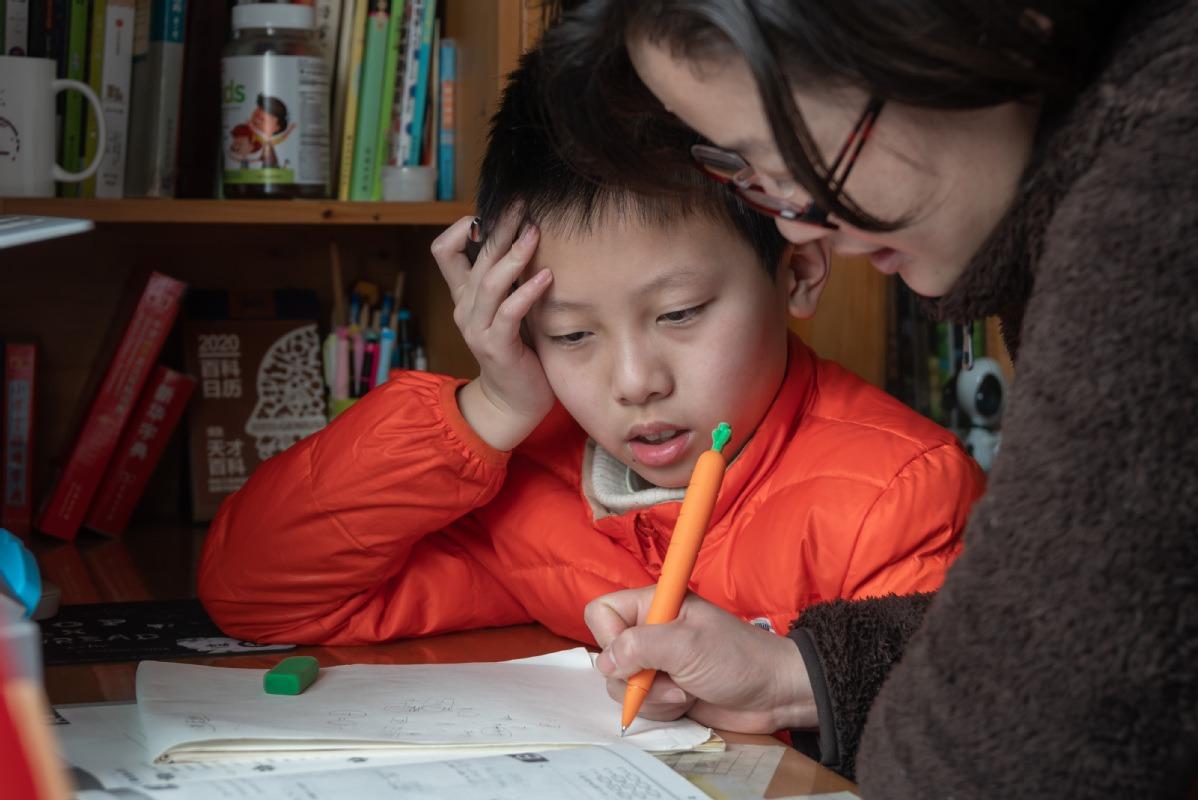 A parent helps her son do his homework at home in Shanghai. (Wang Gang / for China Daily)
A parent helps her son do his homework at home in Shanghai. (Wang Gang / for China Daily)
I was lying face down on a massage table, getting acupuncture and cupping therapy for my aching waist in a hospital in Beijing last week. In the room were a male doctor and two women patients.
By the time I walked into the treatment room, the two women patients were already talking with the doctor.
The doctor and one of the women patients, who had a shoulder problem, were talking about their children's scores in a recent examination. From their conversation, I learned their children, both boys, were first graders in the same junior high school.
The woman said she was proud of her son who had scored a high 85, the third-highest score in the class, in a mathematics exam, while the doctor said he was disappointed with his son's score of 65. The doctor then asked the woman how she had brought up such a "smart student".
READ MORE: Applications for China's postgraduate studies exam down 7.6%
Fixing a good study routine and inculcating in the child the value of education are necessary and so is sending him to an after-school institution, the woman said, revealing her son's "success recipe". After coming home from school late in the afternoon, her son takes a nap for less than an hour before doing his daily homework and solving question papers given by the after-school institution. "I make sure he goes to bed before 11 pm, though," the woman said.
Their conversation then turned to their sons' planned weekend outing to Qufu in Shandong province, the hometown of Confucius (551-479 BC), the greatest educator in China. Both parents seemed to support the excursion organized by the school, though they were worried about their sons missing the weekend after-school classes. They agreed, however, that they would talk with the after-school tutors to see if their sons could make up for the missed classes.
"Do you make sure your children study the lessons before they are taught in class?" the other woman patient asked. "For years, I've sought the help of private tutors to teach the school lessons in advance to my son, who is now in senior high school. It is very helpful."
The hour-long treatment I had was a different sort of experience, as I got an insight into how parents today prepare their children to excel in exams. Before leaving the treatment room, however, they all agreed that the increase in the number of PE classes and exercise time is good for students' physical health, though the requirements are too taxing for their children who are either overweight or underweight.
Ensuring their children receive the best possible education is of the highest priority for Chinese parents. In urban areas, higher education has become a necessity for youths, for it helps them land well-paying jobs. Since having high scores in exams is the best way to get admission to good schools and universities and get good jobs, China's education system has become exam-oriented. This has increased the already heavy burden on students.
ALSO READ: CPC senior stresses Party building in Party, state agencies
To end this unhealthy trend, the central education authorities have implemented a number of rules, requiring schools to allow students to go home before a fixed time so they can do their homework. Also, homework should not take up all of a child's free time, leaving no time for him or her for outdoor activities where he/she can get some physical exercise.
Besides, after-school institutions have been ordered to not teach students school lessons in advance, because that increases students' burden and interrupts their normal school education process. That measure has led many an after-school institution to go bankrupt and thousands of private tutors to lose their jobs. Some after-school institutions and teachers now offer classes for non-compulsory subjects such as painting, calligraphy, music and dancing.
As Rome was not built in a day, we should have patience for the new rules to yield results. But measures should be taken to ensure the younger generations' healthy growth, and for that their academic burden should be eased.
The author is former deputy editor-in-chief of China Daily.



